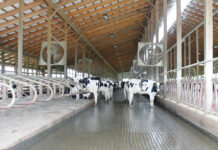By LUKE FRITZ, CED
The extreme cold weather we have been experiencing often times prompts radio and TV newscasts to remind us of items such as to keep your pets inside and how to care for your pets during the cold weather.
For the most part, the effects of severe cold weather on livestock operations go unmentioned. Consider that regardless of what temperature it is, farmers need to milk cows, feed livestock and all of the other routine barn work on a daily basis.
Some people may think that cold weather is tough just on the animals. Actually, cold weather does not bother the animals. As long as they are cared for, they are satisfied. If anything, maybe a little more energy in the feed ration and shelter will suit them quite well. Essentially cold weather is tougher on the operators/producers of the farm than the animals. All non-Amish farms today are mechanized. Today’s farms have skid loaders, tractors, manure spreaders, barn cleaners, silo unloaders, milking equipment, etc. The problem with all of the equipment is that nothing works well in sub-zero temperatures. Farmers that are tending to livestock find that each job takes twice as long as normal. Sometimes by the time all the chores are done it is time to start over again.
Related: How to test forages in cold weather
Each day presents its’ own set of problems. Frozen water lines or broken water bowls probably greet many producers each morning. Starting tractors and thawing or “breaking loose” manure spreaders would be another time consuming job, not to mention the additional time required to scrape everything clean so that it will be easier to break loose tomorrow. Some farmers will discover that the belt, bearing, chain or switch will need replaced on the coldest day, due to frozen conditions. This may require climbing 60’ up the silo with tools to make the repair. Zero temperatures create difficult environments for machinery.
These were just a few things that must be done during extended cold periods. Bear in mind: milking, feeding, hauling manure and grinding feed are not optional. These are not jobs you can wait until it warms up to do. Farmers know their equipment and livestock needs very well and most have developed a system that lets them get through these cold snaps although with some degree of difficulty and continue to produce at normal levels.










